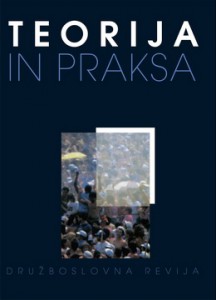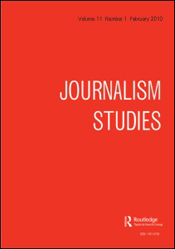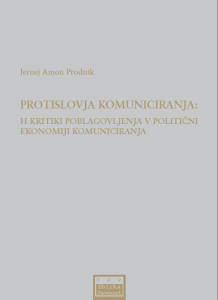 A new article by a member of PolCoRe Jernej Amon Prodnik, which was coauthored together with Marko Milosavljevič and Lenart J. Kučić, was recently published in Teorija in praksa (vol. 52, no. 4, pp.: 612-630) under the title “Securing the communication of journalists with their sources as a form of source protection – editorial policy of Slovenian media regarding communication and technology”. The article is open access and it is available via the following link: http://www.fdv.uni-lj.
A new article by a member of PolCoRe Jernej Amon Prodnik, which was coauthored together with Marko Milosavljevič and Lenart J. Kučić, was recently published in Teorija in praksa (vol. 52, no. 4, pp.: 612-630) under the title “Securing the communication of journalists with their sources as a form of source protection – editorial policy of Slovenian media regarding communication and technology”. The article is open access and it is available via the following link: http://www.fdv.uni-lj.
Archiv pro štítek: publication
The Powers That Tweet
 Právě vyšel článek The Powers That Tweet: Social Media as News Sources in the Czech Republic v časopisu Journalism Studies. Členové skupiny PolCoRe Radim Hladík a Václav Štětka v něm zkoumají intenzitu užívání sociálních sítí (Facebooku a Twitteru) jako zdrojů v českých médiích.
Právě vyšel článek The Powers That Tweet: Social Media as News Sources in the Czech Republic v časopisu Journalism Studies. Členové skupiny PolCoRe Radim Hladík a Václav Štětka v něm zkoumají intenzitu užívání sociálních sítí (Facebooku a Twitteru) jako zdrojů v českých médiích.
Odkaz na článek zde: The Powers That Tweet
AKTUALIZACE: Předtisková verze článku v pdf: Powers That Tweet (pre-print version)
Media and Democratisation: Challenges for an Emerging Sub-field
 Our member Václav Štětka has just published an article „Media and Democratisation: Challenges for an Emerging Sub-field“ in the new issue of the journal Medijske Studije (Media Studies). The article (co-authored by Nael Jebril and Matthew Loveless) aims to compile an empirically-based understanding of the role of media in countries in transition. The study focuses on the processes of political socialization, behaviour and accountability using examples from three regions: Central andEastern Europe, Latin America, and the Middle East/North Africa.
Our member Václav Štětka has just published an article „Media and Democratisation: Challenges for an Emerging Sub-field“ in the new issue of the journal Medijske Studije (Media Studies). The article (co-authored by Nael Jebril and Matthew Loveless) aims to compile an empirically-based understanding of the role of media in countries in transition. The study focuses on the processes of political socialization, behaviour and accountability using examples from three regions: Central andEastern Europe, Latin America, and the Middle East/North Africa.
The full article is available here: (link)
New Book: Contradictions of Communication
 Jernej Amon Prodnik (member of PolCoRe) has published a book „Contradictions of Communication: Towards a Critique of Commodification in Political Economy of Communication“ which is available in Slovene from Faculty of Social Sciences Ljubljana Press (link).
Jernej Amon Prodnik (member of PolCoRe) has published a book „Contradictions of Communication: Towards a Critique of Commodification in Political Economy of Communication“ which is available in Slovene from Faculty of Social Sciences Ljubljana Press (link).
The book emphasizes that in the current historical epoch contradictions that are a constitutive part of capitalist societes broaden and expand into communication. Author points out that social changes and communication technologies need to be analysed in a historical manner, in the context of the existing asymmetries of power. The starting point of the monograph is in the political economy of communication, that offers a way of holistically analysing structural, historical changes and the most fundamental social relations, with special focus on communication, media, and information. Analyses in the book move between fundamental theoretical insights that build on critical approaches to social sciences, and currently topical issues.
Sociální média jako nová výzva pro výzkum politické participace
Právě vyšel článek „Sociální média jako nová výzva pro výzkum politické participace“ Jaroslava Švelcha a Lenky Vochocové, členů skupiny PolCoRe. Článek shrnuje normativní a teoretické pohledy na participaci a nová média a slouží jako úvod do problematiky pro českou vědeckou obec.
 Celý text je dostupný volně na webu Sociologického časopisu: link
Celý text je dostupný volně na webu Sociologického časopisu: link
Language management in English-language online discussion forums
Our member Jaroslav Švelch has just published the article “Excuse my poor English: language management in English-languag
Link: http://www.degr
New article on citizens‘ engagement with the 2013 Czech Parliamentary Elections campaign on Facebook
 This article, written by PolCoRe members Václav Štětka and Lenka Vochocová, was published in a special issue of the journal Teorija in Praksa. The article analyses the use of Facebook by political parties during the campaign for the 2013 Parliamentary Elections in the Czech Republic, as well as the content of communication produced by citizens on political parties‘ Facebook profiles.“
This article, written by PolCoRe members Václav Štětka and Lenka Vochocová, was published in a special issue of the journal Teorija in Praksa. The article analyses the use of Facebook by political parties during the campaign for the 2013 Parliamentary Elections in the Czech Republic, as well as the content of communication produced by citizens on political parties‘ Facebook profiles.“
Link to the full issue
PDF version of the article: A DIALOGUE OF THE DEAF, OR COMMUNITIES OF DEBATE? THE USE OF FACEBOOK IN THE 2013 CZECH PARLIAMENTARY ELECTIONS CAMPAIGN
“Grammar Nazis never sleep”: Facebook humor and the management of standard written language
Our member Jaroslav Švelch has co-authored the article “Grammar Nazis never sleep”: Facebook humor and the management of standard written language, which has just been published by Language Policy. Being among the first academic explorations of the Grammar Nazi phenomenon, the article argues that individuals who organize under the title Grammar Nazis on Czech Facebook are usually non-experts, whose activities are driven by standard language ideology, and who associate “grammar” primarily with orthography. Given that the knowledge of orthography is related to one’s education and cultural capital, it thus serves as an instrument of social differentiation.
Člen skupiny PolCoRe Jaroslav Švelch je spoluautorem článku “Grammar Nazis never sleep”: Facebook humor and the management of standard written language, který právě vyšel v časopise Language Policy. Jedná se o jeden z prvních článku o fenoménu Grammar Nazis. Dospívá k závěru, že lidé, kteří se na českém Facebooku sdružují pod hlavičkou Grammar Nazis jsou obvykle laici, jejichž aktivita je však ovlivněna ideologií standardního jazyka a kteří si „gramatiku“ spojují primárně s ortografií (pravopisem). Vzhledem k tomu, že znalost pravopisu souvisí se vzděláním a kulturním kapitálem, slouží tak jako nástroj sociální diferenciace.
Whither slacktivism?
Special Issue of tripleC Journal Out Now

Special issue of tripleC journal: Philosophers of the World Unite! Theorising Digital Labour and Virtual Work – Definitions, Dimensions and Forms co-edited by Jernej Amon Prodnik (member of PolCoRe) was published in September 2014.
This issue edited by Marisol Sandoval, Christian Fuchs, Jernej A. Prodnik, Sebastian Sevignani, Thomas Allmer aims to contribute to building a theoretical framework for the critical analysis of digital labour, virtual work, and related concepts that can initiate further debates, inform empirical studies, and inspire social struggles connected to work and labour in and beyond digital capitalism.
Pokračování textu
